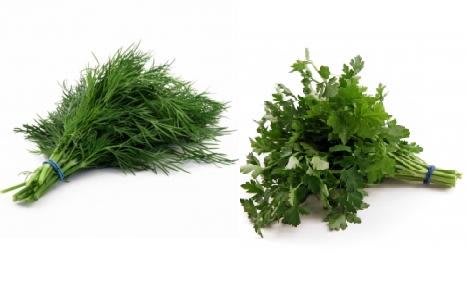If you’ve just harvested herbs from your own garden and you know they haven’t been exposed to pesticides or other contaminants, give them a visual inspection (with a light) for bugs or dirt. If they have neither, there’s no need to wash them before storing. Leaves of fresh herbs are much easier to handle and chop when they are completely dry. If you plan to store them in the refrigerator, know that extra moisture on the leaves promotes decay. If you buy herbs from a supermarket or you can see or feel dirt on the herbs from your own garden (especially if they were harvested close to the ground), you’ll have to wash and visually check them before storing. (As Rabbi Dovid Bistricer, the OU’s expert on herbs and spices pointed out to me, pesticides are not an absolute safeguard against insects, and washing is not a substitute for checking. To learn more about inspecting vegetable, view the OU Guide to Preparing Fruits and Vegetables,
Washing:
When you only have a few sprigs to wash, hold them under the tap for a rinse, then shake them off and pat them dry between paper towels. With larger bunches of herbs it’s more effective to submerge them in water the way you would wash salad greens. Fill the bucket of a salad spinner or a large bowl with cold water. Drop in the herbs and swish them around so that the dirt releases and can sink. to the bottom. Then lift them out of the water and dry them either in the salad spinner or by patting them dry between paper towels or in a clean dishtowel. If you have a large bunch of herbs with all the stems at the bottom, the way parsley and cilantro are usually sold, the process is even easier. Hold the herb bunch by the stems and plunge it up and down in the water. Still holding it by the stems, remove it from the water and shake it over the sink or out the backdoor, snapping your wrist as if you were shaking down a thermometer. If they’re still not dry, spin them or pat dry with paper towels.
Storing:
The best way to store fresh herbs is to put them into a resealable plastic freezer bag, and keep it at 40 to 45 degrees F, the temperature in a refrigerator’s crisper. Don’t wash them before you store them-the drier the leaves are the longer and fresher they will keep. When I have several varieties, I put them in separate bags and loosely pack them in a tightly sealed large plastic container, and then keep it in the vegetable crisper or on a refrigerator shelf, but I avoid cold spots like the rear of the lower shelf. Some tender-leafed herbs, most notably basil and lemon verbena, will turn black at temperatures below 40 degrees F. I try to keep the container loosely packed so the herbs don’t crush. If just harvested, most herbs should remain in good shape for well over a week, although their intensity of flavor diminishes as time goes on. Herbs with tough leaves like rosemary, thyme, sage, and bay will keep for two weeks or longer, but herbs with delicate leaves, like chervil or lemon verbena, will last only a few days. Some cooks like to wrap the herbs in damp paper towels and then put them in plastic bags, but the extra moisture only invites decay. The resealable produce bags that have tiny holes for air circulation are effective if the leaves are wet and moisture needs to escape, but herbs with dry leaves will last much longer if sealed airtight. The conventional wisdom that advises storing cut herbs as if they were cut flowers, standing up in a glass or pitcher of water either on the counter on in the refrigerator, makes sense if you are keeping herbs a day or two, but like cut flowers, their stems soon begin to rot and the water becomes rank. Even if you change the water, I find the herbs suffer. And if the glass is placed in the refrigerator, it inevitably gets knocked over, spilling the water onto everything below. The only time I stand herb sprigs in water is when I want to hold them at room temperature for more than an hour. Basil, cilantro, and parsley are three that keep particularly well for a few days with their stems in water on a cool kitchen counter. You might want to try cleaning a batch at a time, chopping it up and add enough oil to cover and freeze it. Have fun.
The words of this author reflect his/her own opinions and do not necessarily represent the official position of the Orthodox Union.

